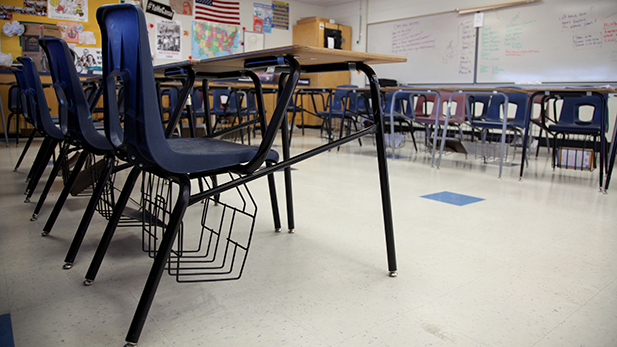
Listen
Gov. Doug Ducey proposed Thursday taking $1.8 billion from the State Land Trust Fund for K-12 education in the next five years and the reviews from the education community was mixed.
“I’m cautious of the proposal at this time,” said Jen Darland, co-founder and vice president of the Arizona Education Network.
The plan would require approval of legislators and state voters, and it comes amid ongoing criticism of the Republican governor and Republican-controlled Legislature for their cuts to education in the budget for next fiscal year.
Ducey’s plan would quadruple what schools can take out of the state land trust fund each year. Calvin Baker, superintendent of the Vail Unified School District calls the proposal a step in the right direction.
For a classroom at Vail with about 30 students it would mean an extra $9,000 a year, “and that makes it possible do get a couple of laptops, some supplies, or maybe a salary increase for the teachers– all things that are desperately needed,” Baker said.
The State Land Trust Fund was set up in 1912 at statehood to help fund education and other programs. It included 10 million acres deeded by the federal government to the state. The sale or lease of the land provides the trust's proceeds.
The trust now has 9.2 million acres, and the current voter-approved formula allows a payout of 2.5 percent of the fund balance annually.
Last year, that payout was about $80 million, divided equally among school districts based on enrollment. That comes to about $72 for each of Arizona’s 1.1 million public school students.
Ducey said Thursday that the trust has money to spare.
“We have $5 billion in the bank and up to $70 billion in potential future value,” he said. “We are getting less than $100 million a year for it. We can do better.”
The $1.8 billion over five years would increase the annual per-student payout to roughly $323. Four times was the payout from the fund was spent per student last year.
“I think it’s a very smart way to go about finding additional money without raising taxes,” said Lea Márquez Peterson, president and CEO of the Hispanic Chamber of Commerce.
She stood by Ducey’s side when he made the announcement and said it is one of many solutions needed to reform education in Arizona.
State Superintendent of Public Instruction Diane Douglas said in a statement that she supports the governor's plan is looking forward to working with him.
Douglas has criticized the governor and the Legislature for their education funding decisions and has clashed with Ducey on policy and personnel issues.
Voters approved an increase in education withdrawals from the State Land Trust Fund in 2012. Ducey helped push that initiative as state treasurer.
State lawmakers will have to approve Ducey’s plan next year. If it passes, it would be on the November 2016 ballot and voters will decide whether to allow schools to dig deeper into the state land trust fund

By submitting your comments, you hereby give AZPM the right to post your comments and potentially use them in any other form of media operated by this institution.